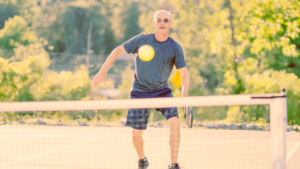Picture this: a fast-paced game played on a compact court, requiring skill, strategy, and lightning-fast reflexes. It’s not tennis, it’s not badminton, and it certainly isn’t ping pong. Welcome to the exhilarating world of pickleball, a sport that has been gaining momentum and capturing the hearts of millions across the globe. As its popularity continues to soar, a question arises: could pickleball be the next big thing in the Olympic Games? With its unique blend of competition and camaraderie, some are beginning to wonder if this remarkable sport could one day grace the world’s biggest stage.
Table of Contents
- The Growing Popularity of Pickleball at the Grassroots Level
- Analyzing the Potential for Pickleball to Join the Olympic Games
- Key Factors to Consider in Evaluating Pickleball’s Olympic Viability
- Recommendations to Support Pickleball’s Olympic Aspirations
- Exploring the Impact of Pickleball’s Olympic Inclusion on the Sport’s Growth and Development
- Q&A
- The Way Forward

The Growing Popularity of Pickleball at the Grassroots Level
Pickleball, the increasingly popular sport that combines elements of ping pong, tennis, and badminton, is experiencing a surge in grassroots participation. This fun and accessible game is capturing the attention of people of all ages and skill levels, making it a hit in communities across the country.
One of the main reasons for the growing popularity of pickleball is its simplicity. The rules are easy to understand, and it can be played on a smaller court, which makes it perfect for parks, community centers, and even backyard setups. Additionally, pickleball requires less physical exertion compared to other sports, making it ideal for players of varying fitness levels.
Moreover, pickleball fosters a sense of inclusivity and camaraderie among players. Whether you are a seasoned athlete or a complete beginner, there is a place for you on the pickleball court. The friendly and welcoming nature of the community ensures that everyone feels encouraged and supported, further fueling its grassroots growth.
If you haven’t tried pickleball yet, now is the perfect time to jump into this thrilling sport. Join the millions of pickleball enthusiasts who are discovering the joy and excitement of this addictive game. Who knows, you might just become the next pickleball legend in your neighborhood!

Analyzing the Potential for Pickleball to Join the Olympic Games
Pickleball, the intriguing combination of tennis, badminton, and table tennis, has been gaining immense popularity across the globe. With its rapid growth and widespread participation, the question has naturally arisen: Could pickleball make its way into the Olympic Games?
Looking closely at the potential for pickleball in the Olympics, several key factors need to be considered. Firstly, the sport’s accessibility and inclusivity cannot be overlooked. Pickleball is a game that people of all ages and skill levels can enjoy, making it a perfect fit for the Olympic ethos of promoting sports for all.
Moreover, the international appeal of pickleball is rapidly expanding, with pickleball associations and federations being established worldwide. This demonstrates a genuine interest and commitment from various countries in promoting and developing the sport. Inclusion in the Olympics would not only increase the sport’s global recognition but also foster its growth in new regions.
Additionally, the dynamic and fast-paced nature of pickleball would inject excitement into the Olympic Games. Its unique blend of strategy, agility, and precision offers a captivating viewing experience for spectators, aligning with the demand for innovative and entertaining sports.
As we critically analyze the potential for pickleball in the Olympics, it becomes evident that this sport has the ingredients to captivate both athletes and audiences alike. With its inclusive nature, global appeal, and thrilling gameplay, it is not far-fetched to imagine pickleball making a triumphant debut on the Olympic stage.

Key Factors to Consider in Evaluating Pickleball’s Olympic Viability
When evaluating the viability of pickleball as an Olympic sport, there are several key factors that need to be considered. These factors range from the sport’s popularity and global reach to its potential for growth and appeal to a diverse audience.
One crucial factor to consider is pickleball’s soaring popularity. With its easy-to-learn rules and inclusive nature, pickleball has gained a significant following worldwide. The sport attracts people of all ages and skill levels, making it an excellent candidate for the Olympics. Its widespread popularity ensures a large pool of athletes competing at a high level, generating intense competition and excitement for spectators.
Furthermore, pickleball’s global reach must be assessed. It is important to evaluate its presence in different regions and analyze its potential for growth on a global scale. The sport’s presence in various countries can contribute to the Olympic Games’ mission of fostering international relations and promoting cultural exchange.
In addition, pickleball’s ability to appeal to a diverse audience is a significant factor in determining its Olympic viability. The sport’s simplicity and adaptability make it accessible to people of all backgrounds and physical abilities. Incorporating pickleball into the Olympics would add another dimension of inclusivity and diversity to the games, attracting a broader audience and fostering a sense of unity among participants.
In conclusion, evaluating pickleball’s Olympic viability requires considering its popularity, global reach, and appeal to a diverse audience. With its ability to captivate a wide range of individuals and its potential for growth on a global scale, pickleball has a strong case for being included in the Olympic Games.
Recommendations to Support Pickleball’s Olympic Aspirations
Pickleball, the fast-growing paddle sport that combines elements of tennis, badminton, and table tennis, is gaining immense popularity worldwide. As players and enthusiasts of this exciting sport, we believe that pickleball should be included in the Olympic Games. To support pickleball’s Olympic aspirations, we propose the following recommendations:
- Increased visibility and promotion: It is crucial to raise awareness about pickleball at a global level. Efforts should be made to showcase the sport through televised matches, social media campaigns, and partnerships with sporting goods companies. Creating engaging content and organizing international tournaments can also attract media attention and generate interest among potential sponsors.
- Standardization and governance: To be considered for the Olympics, pickleball needs to establish standardized rules and regulations that align with international sporting standards. The creation of a dedicated governing body could help oversee the development and implementation of these guidelines, ensuring fairness and consistency in tournaments worldwide.
- International participation and diplomacy: Encouraging wider participation from countries that have yet to embrace pickleball is essential. Organizing international pickleball workshops, coaching programs, and exchange initiatives can help foster goodwill and encourage investment in infrastructure and training. Collaboration with existing Olympic sports federations and committees could also facilitate the integration of pickleball into the Games.
Pickleball has shown incredible potential as a competitive sport that promotes physical activity, strategy, and inclusivity. By implementing these recommendations, we can help propel pickleball’s journey towards becoming an Olympic sport, providing athletes from around the globe with an opportunity to showcase their skills and passion on the world stage.
Exploring the Impact of Pickleball’s Olympic Inclusion on the Sport’s Growth and Development
Pickleball, a sport that has been rapidly gaining popularity worldwide, has recently received a significant boost with its inclusion in the Olympic games. The decision to include pickleball in the Olympics is expected to have a profound impact on the sport’s growth and development.
First and foremost, being an Olympic sport will undoubtedly increase the visibility of pickleball on a global scale. As millions of viewers tune in to watch the Olympics, they will be introduced to this exciting and fast-paced game. This newfound exposure has the potential to attract a whole new wave of enthusiasts, both young and old, who may have never heard of pickleball before.
The Olympic inclusion will also lead to an increase in funding and resources for pickleball. National Olympic Committees and governing bodies of various countries will likely invest in coaching programs, facilities, and training infrastructure to enhance their chances of success in the Olympic events. This influx of resources will not only benefit elite athletes but also trickle down to grassroots-level players, providing them with better opportunities to learn and excel in the sport.
- Increased global visibility through the Olympics
- Attracting new enthusiasts to the sport
- Boost in funding and resources
Overall, the inclusion of pickleball in the Olympics marks a significant milestone for the sport. It opens up a world of possibilities and fosters a newfound sense of competition, camaraderie, and growth in the pickleball community.
Q&A
Could pickleball become an Olympic sport?
Pickleball enthusiasts believe so. It has steadily grown in popularity and international participation, making it a potential contender for the Olympic stage in the future.
What factors contribute to pickleball’s potential as an Olympic sport?
Pickleball’s simplicity, accessibility, and appeal to a broad age range are some of the factors that make it a strong candidate for inclusion in the Olympic Games.
How does pickleball compare to current Olympic sports?
Pickleball’s unique combination of elements from tennis, badminton, and ping pong offers a fresh sporting experience to both players and spectators, setting it apart from the more traditional Olympic sports.
What challenges does pickleball face in becoming an Olympic sport?
One of the main challenges is gaining recognition and acceptance at the international level. Additionally, there is a need for standardization of rules and regulations to establish a universal framework for competitive play.
Could pickleball bring anything new to the Olympics if it were to become an Olympic sport?
Pickleball’s fast-paced nature and focus on player interaction can inject an exciting and dynamic element to the Olympic Games, attracting a new audience and diversifying the sporting experience.
How can pickleball continue to grow and gain support for Olympic inclusion?
Continued promotion, both at the grassroots level and through high-profile events, can help raise pickleball’s profile and garner support from the global sporting community, increasing its chances of becoming an Olympic sport.
When might we see pickleball in the Olympics?
Predicting the specific timeline is challenging, as the process for including a new sport in the Olympics is complex and lengthy. However, with its rising popularity, it is not unreasonable to hope for pickleball’s inclusion in the near future.
The Way Forward
As we contemplate the future of Olympic sports, one unlikely contender has captured the hearts and paddles of millions around the world — pickleball. While this whimsically-named game may seem like a peculiar choice for Olympic glory, its soaring popularity and undeniable appeal have led many to ponder, could pickleball someday take its place amongst the elite?
From its humble roots in the backyards of suburban America to the grandest stages of international competition, pickleball has proven itself as the sport that defies convention. With a unique blend of tennis, badminton, and table tennis, it has managed to find a sweet spot, appealing to both the young and old, the casual and the competitive.
At a time when the sporting world is constantly in search of fresh excitement, pickleball’s rapid rise cannot be ignored. It has carved a place in the hearts of so many, its influence reaching far beyond the traditional sports arenas. The captivating rhythm of the ball bouncing off paddles, the strategic dances around the court, and the symphony of laughter and cheers have transformed pickleball into a mesmerizing spectacle.
But for pickleball to ascend to the hallowed halls of the Olympic Games, it must face an arduous journey. Mingling with the giants of sports such as swimming, athletics, and gymnastics, it must prove its worthiness. The road ahead may be daunting, but pickleball enthusiasts remain hopeful, fostering dreams of competitive showdowns where nations battle it out on the pickleball courts, representing their flags with pride.
It is within this realm of possibilities that we must imagine a future Olympic Games, where pickleball’s quirky devotions and impassioned fanbase are recognized and celebrated on the grandest of stages. We envision athletes who possess the agility and finesse of professional tennis players, the explosive energy of badminton stars, and the precision and quick reflexes of table tennis champions, all brought together in the thrilling pursuit of Olympic gold.
While some may scoff at the notion of pickleball’s Olympic aspirations, it is essential to remember that great change is often born from audacity and vision. The Olympic Games have always been a platform for embracing the unexpected, for pushing the boundaries of what is possible. And perhaps, just perhaps, one day we will witness pickleball’s grand debut, as athletes step onto the Olympic stage, ready to etch their names in history.
In a world that thrives on traditional conventions, it is the iconoclasts that inspire us the most—a pursuit where dreams meet reality, and legends are born. The realm of Olympic sports has always embraced trailblazers, and if there’s one thing pickleball has taught us, it’s never to underestimate the power of a seemingly whimsical dream. So let us rally behind this mighty underdog, keeping the vision of pickleball’s Olympic dreams alive, for it is in the willingness to dream that anything becomes possible.
As an affiliate, my content may feature links to products I personally use and recommend. By taking action, like subscribing or making a purchase, you’ll be supporting my work and fueling my taco cravings at the same time. Win-win, right?
Want to read more? Check out our Affiliate Disclosure page.




